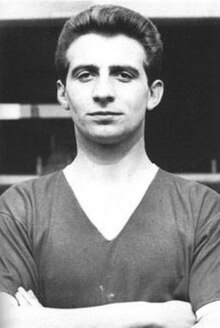David Pegg

Pegg in 1956
|
|||
| Personal information | |||
|---|---|---|---|
| Date of birth | 20 September 1935 | ||
| Place of birth | Highfields, West Riding of Yorkshire, England | ||
| Date of death | 6 February 1958 (aged 22) | ||
| Place of death | Munich, West Germany | ||
| Playing position | Outside left | ||
| Youth career | |||
| Manchester United | |||
| Senior career* | |||
| Years | Team | Apps | (Gls) |
| 1952–1958 | Manchester United | 127 | (24) |
| National team | |||
| England U23 | 3 | (?) | |
| 1957 | England | 1 | (0) |
| * Senior club appearances and goals counted for the domestic league only. |
|||
David Pegg (20 September 1935 – 6 February 1958) was an English footballer and one of the eight Manchester United players who lost their lives in the Munich air disaster on 6 February 1958.
He was born in Highfields near Doncaster in the West Riding of Yorkshire, in September 1935, one of three children born to miner William Pegg and his wife Jessie. His father also played amateur football to a high standard during the 1930s, winning a number of trophies with local football teams.
He signed for United on leaving school in 1950 and made his first team debut in the Football League First Division against Middlesbrough on 6 December 1952, aged 17.
He was the club's first-choice outside left until the final few months before the disaster (when he was displaced by Albert Scanlon) and had collected two League Championship winner's medals in the two seasons leading up to the Munich air disaster. He also helped them reach the European Cup semi-finals twice. His performance against Real Madrid in the 1956-57 semi-finals reportedly inspired the Spanish giants to sign a new left-back specifically to combat Pegg's talents in the future, although his death less than a year later meant that he never played against them again.
He was capped once for the England national football team, his solitary appearance coming in 1957, and was tipped by many to succeed Tom Finney in the England team. Still only 22 years old when he died, he was one of the youngest people to die out of the 23 who lost their lives at Munich.
He was born in the village of Highfields, north of Doncaster and he was buried in the nearby Redhouse Cemetery. A memorial chair was dedicated in his memory at St. George's Church in Highfields and when that church was closed the chair was moved to All Saints' Church in Woodlands which now serves both villages.
...
Wikipedia
